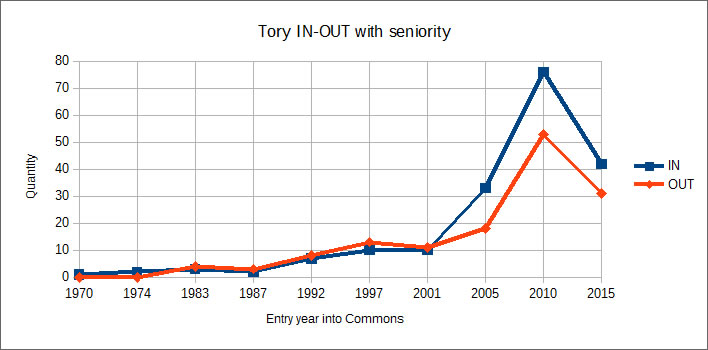The Tory Chosen Ones
Posted by Thersites on UTC 2016-06-28 10:35
Whilst slumped in a chair yesterday waiting for the microwave to perform its secret ministry I got myself heated up with speculations about the malign effect of the tight central control over the selection of its election candidates which the Conservative party has pushed through in the course of the last decade or so.
During this time local associations, previously the backbone of solid Tory thought among the people, have been increasingly sidelined by diktat from Conservative Central Office. Lists of centrally approved applicants were imposed upon the rank and file, all-women lists, 'diverse' lists and so on. These measures were part of the 'modernisation' of the party – 'Blairisation', if your prefer. We were told that the 'Turnip Taliban' had no place in the modern, 'progressive' party.
Central control has serious consequences for the representation function of MPs. If the candidates do not truly represent the interests and preferences of their constituency what role do they play in Parliament apart from just representing the leaders of their party?
There is a reason that there is so much anecdotal and electoral anger among the grass roots of the party.
We might expect these leadership-approved, 'modern' MPs to be either more gratefully supine in following the party line or simply share the same mindset as the party leaders. How loyal were they to their masters in the government-backed Remain campaign in the EU Referendum?
Hypothesis testing time
Merging Guido's list of the voting intentions of Conservative MPs in the EU Referendum with the Wikipedia list of MPs by their first election year produced the following table:
| Entry | Remain | Leave | ND |
| 1970 | 1 | 0 | 0 |
| 1974 | 2 | 0 | 0 |
| 1983 | 3 | 4 | 0 |
| 1987 | 2 | 3 | 0 |
| 1992 | 7 | 8 | 0 |
| 1997 | 10 | 13 | 0 |
| 2001 | 10 | 11 | 0 |
| 2005 | 33 | 18 | 0 |
| 2010 | 76 | 53 | 2 |
| 2015 | 42 | 31 | 1 |
Putting it graphically:

The numbers of MPs who entered Parliament before 2005 show an almost perfect 50:50 split on the issue in the EU Referendum of 2016. In contrast, those who entered in 2005 or after show show a striking divergence.
The obvious fact is that suddenly from 2005 intake onwards there was an appreciable majority of Conservative MPs who went on to support the official Remain policy in the 2016 Referendum.
Whilst I would not claim that these figures 'proved' the hypothesis that the candidates chosen under central control were either supine or orthodox group-thinkers, there is nevertheless food for thought there. Perhaps the central control in recent years did change the soul of the Conservative party.
And if that is so, then if, when and whenever there is a general election the malign CCHQ stranglehold on candidate selection has to be relaxed so that local associations can take into account the Europhile affinity of their applicants and select accordingly.
0 Comments UTC Loaded:
Input rules for comments: No HTML, no images. Comments can be nested to a depth of eight. Surround a long quotation with curly braces: {blockquote}. Well-formed URLs will be rendered as links automatically. Do not click on links unless you are confident that they are safe. You have been warned!